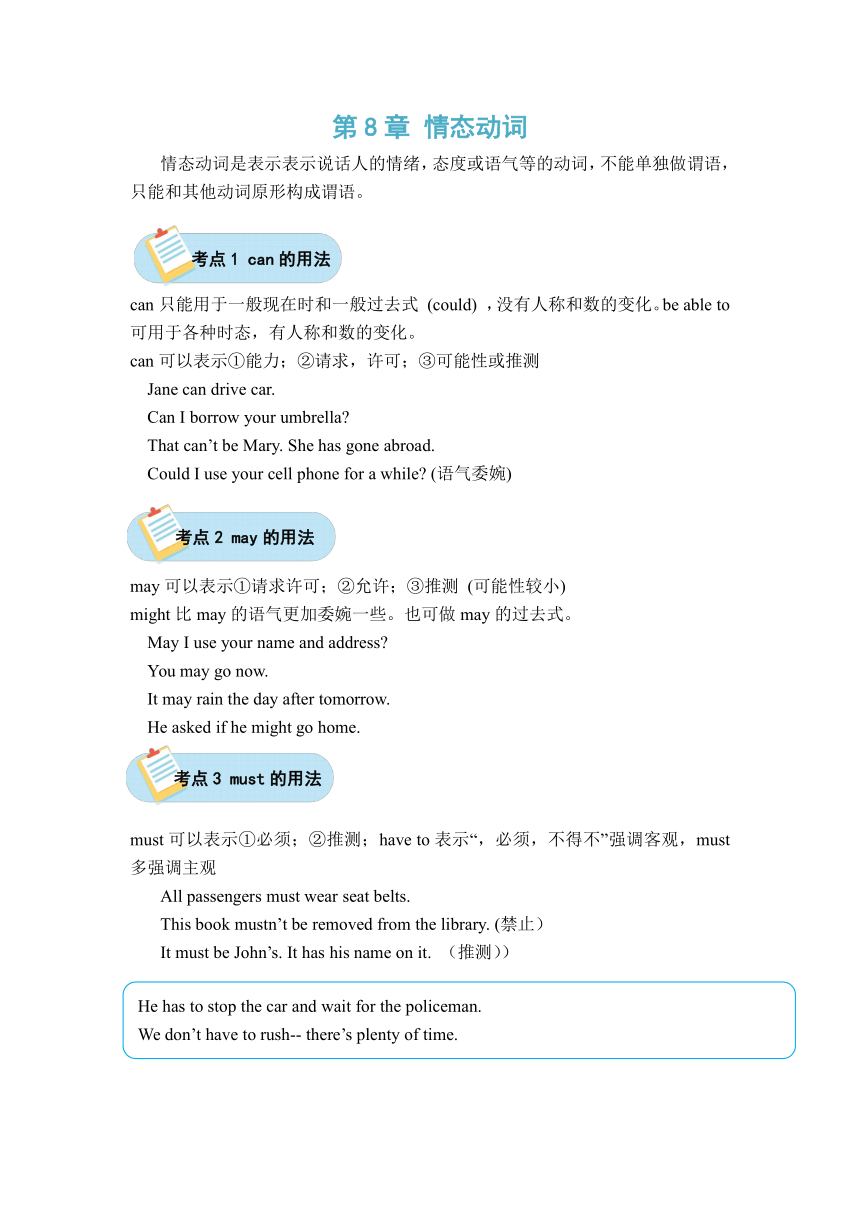2024年中考英语语法复习讲义 情态动词
文档属性
| 名称 | 2024年中考英语语法复习讲义 情态动词 |

|
|
| 格式 | docx | ||
| 文件大小 | 40.4KB | ||
| 资源类型 | 教案 | ||
| 版本资源 | 人教新目标(Go for it)版 | ||
| 科目 | 英语 | ||
| 更新时间 | 2024-06-26 15:09:34 | ||
图片预览

文档简介
第8章 情态动词
情态动词是表示表示说话人的情绪,态度或语气等的动词,不能单独做谓语,只能和其他动词原形构成谓语。
can只能用于一般现在时和一般过去式 (could) ,没有人称和数的变化。be able to可用于各种时态,有人称和数的变化。
can可以表示①能力;②请求,许可;③可能性或推测
Jane can drive car.
Can I borrow your umbrella
That can’t be Mary. She has gone abroad.
Could I use your cell phone for a while (语气委婉)
may可以表示①请求许可;②允许;③推测 (可能性较小)
might比may的语气更加委婉一些。也可做may的过去式。
May I use your name and address
You may go now.
It may rain the day after tomorrow.
He asked if he might go home.
must可以表示①必须;②推测;have to表示“,必须,不得不”强调客观,must多强调主观
All passengers must wear seat belts.
This book mustn’t be removed from the library. (禁止)
It must be John’s. It has his name on it. (推测))
need可以表示①作情态动词; ②作实义动词
There’s enough time for you to go to the airport. You needn’t hurry up. (安徽中考)
I don’t need to buy a new backpack. = I needn’t buy a new backpack.
--Need I answer the question
--Yes, you must/have to.
--No, you needn’t.
should可以表示①应该;②推测;
We should protect the environment.
She left hours ago. She should be home now.
表示最好,缩写为 ’d better
You’d better eat these bananas before they go bad.
情态动词是表示表示说话人的情绪,态度或语气等的动词,不能单独做谓语,只能和其他动词原形构成谓语。
can只能用于一般现在时和一般过去式 (could) ,没有人称和数的变化。be able to可用于各种时态,有人称和数的变化。
can可以表示①能力;②请求,许可;③可能性或推测
Jane can drive car.
Can I borrow your umbrella
That can’t be Mary. She has gone abroad.
Could I use your cell phone for a while (语气委婉)
may可以表示①请求许可;②允许;③推测 (可能性较小)
might比may的语气更加委婉一些。也可做may的过去式。
May I use your name and address
You may go now.
It may rain the day after tomorrow.
He asked if he might go home.
must可以表示①必须;②推测;have to表示“,必须,不得不”强调客观,must多强调主观
All passengers must wear seat belts.
This book mustn’t be removed from the library. (禁止)
It must be John’s. It has his name on it. (推测))
need可以表示①作情态动词; ②作实义动词
There’s enough time for you to go to the airport. You needn’t hurry up. (安徽中考)
I don’t need to buy a new backpack. = I needn’t buy a new backpack.
--Need I answer the question
--Yes, you must/have to.
--No, you needn’t.
should可以表示①应该;②推测;
We should protect the environment.
She left hours ago. She should be home now.
表示最好,缩写为 ’d better
You’d better eat these bananas before they go bad.
同课章节目录
- 词法
- 名词
- 动词和动词短语
- 动词语态
- 动词时态
- 助动词和情态动词
- 非谓语动词
- 冠词
- 代词
- 数词和量词
- 形容词副词及其比较等级
- 介词和介词短语
- 连词和感叹词
- 构词法
- 相似、相近词比较
- 句法
- 陈述句
- 一般疑问句和否定疑问句
- 特殊疑问句及选择疑问句
- 反意疑问句
- 存在句(There be句型)
- 宾语从句
- 定语从句
- 状语从句
- 主谓一致问题
- 简单句
- 并列句
- 复合句
- 主谓一致
- 主、表语从句
- 名词性从句
- 直接引语和间接引语
- 虚拟语气
- 感叹句
- 强调句
- 倒装句
- 祈使句
- 句子的成分
- 句子的分类
- 题型专区
- 单项选择部分
- 易错题
- 完形填空
- 阅读理解
- 词汇练习
- 听说训练
- 句型转换
- 补全对话
- 短文改错
- 翻译
- 书面表达
- 任务型阅读
- 语法填空
- 其他资料
